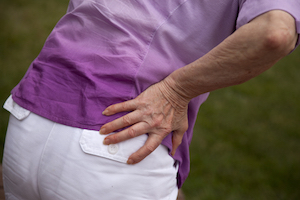News
Exercise & therapy help with pain and improve hip arthritis

Updated review is needed to determine if treatments should be used
Hip osteoarthritis is a condition in which cartilage that surrounds and protects the hip joint gradually wears away. This causes bones to rub against one another and leads to pain and disability in patients with the condition. When it comes to non-surgical (conservative) treatment for hip osteoarthritis, exercise therapy and manual therapy are often recommended first. Exercise therapy includes aerobic exercise and a number of other different exercises designed to improve strength and range of motion, or flexibility of the hip. Manual therapy is a hands-on treatment performed by physical therapists that consists of various mobilizations and manipulations to the joint. Its goal is to improve the mobility of the hip and the surrounding area, which can reduce pain and improve physical function. Although there are studies that support exercise therapy as an effective treatment for hip osteoarthritis, there is little research on the effectiveness of manual therapy for this condition, either when used alone or when combined with exercise therapy. For this reason, a powerful study called a systematic review was conducted, which gathered all the relevant studies on exercise therapy and manual therapy for hip osteoarthritis. This was followed by a meta-analysis, which analyzes each of the studies found in the systematic review with the goal of identifying important trends.
Seven studies are accepted for the review
To find data for the review, 10 major medical databases were searched for studies on the use of exercise therapy, manual therapy or both for hip osteoarthritis. Of the 372 studies that were screened, a total of seven met the necessary criteria and were included in the review. These studies contained information on 886 patients, and they investigated the effects of the treatments on pain, physical function and quality of life. Physical therapists delivered the treatments in all studies except for one, and the nature and frequency of these treatments varied in each of the included studies. Once collected, all studies were then analyzed to determine which of these treatments was most effective for hip osteoarthritis.
Both therapies are effective on their own, but not in combination
Results from the meta-analysis revealed that both exercise therapy and manual therapy are effective for reducing pain and improving physical function in patients with hip osteoarthritis. There was also low-quality evidence that combining exercise therapy and manual therapy can lead to benefits as well, but these benefits were only found to last for a short amount of time. The reason for this may be that patients who had both treatments did not spend as much time on each therapy than those who received only one. Nonetheless, this systematic review and meta-analysis show that both exercise therapy and manual therapy can be helpful for treating hip osteoarthritis. Therefore, patients with this condition should strongly consider seeing a physical therapist for a treatment program that consists of these therapies in order to alleviate their pain and improve their physical function.
-As reported in the December '15 issue of Clinical Rehabilitation
